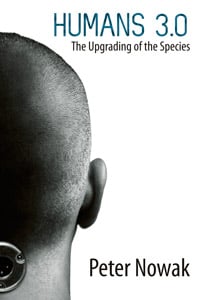Upgraded humans and the quest for a better world
The author is optimistic about humanity’s fate, even welcoming ‘the Singularity,’ when artifical intelligence exceeds the human capacity
Share
HUMANS 3.0: THE UPGRADING OF THE SPECIES
Peter Nowak
Optimistic projections about the future, at least if they keep to the broad-stroke better-living-through-tech predictions, have a lot going for them. Primarily the record. We live far longer than we historically did: lifespans in developed nations have doubled over the past two centuries, and one study suggests that 40 per cent of British girls born in 2013 will reach 100. We live more richly, spending ever less of our wealth on basic necessities like food. We are even, globally, beginning to live more equally: the 20-year life-expectancy gap between developed and undeveloped nations that existed in 1950 has been cut in half.
The optimists also have their problems, including an irritating, to put it mildly, tendency to gloss over the price paid along the way. It’s one thing to read about how agricultural mechanization drove landless labourers into horrific urban living conditions—from which they eventually emerged as better-off factory hands or, these days, knowledge workers—and quite another to live through that sort of economic upheaval. And even that doesn’t begin to touch the core problem. As mutual-fund prospectuses always note, past results do not guarantee future performance. We may be better off for our ancestors’ struggles, but that doesn’t mean our descendents will necessarily benefit from ours.
To his credit, Nowak—who, intriguingly, grew more optimistic about the future over the course of his research—does not ignore potential downsides and rational worries. Amid his welcome for the Singularity (when artificial intelligence exceeds the human capacity) and a projected economy of small-scale entrepreneurs (a future version of sturdy 18th-century yeoman farmers), he discusses how increasing global equality is offset by rising inequality within nations, the challenges of feeding a rising world population, and how climate ruination is a new sort of problem, one we don’t have a past track record of solutions from which we can seek guidance.
But Nowak doesn’t think we are going to overcome those issues because we always have (more or less) or that we will do so in the same ways we always have, but because the relentless pace of the knowledge explosion will fundamentally change us, make us humans 3.0. The better angels of our nature, set to finally be freed by our technological advances, reflect our real natures, Nowak argues: Greed isn’t hardwired, altruism is. In the end, as always, the future is a matter for theology or philosophy: whether or not you think those female British centenarians will enjoy the world they’ll live to see turns on what you think of humans, not their tools.
